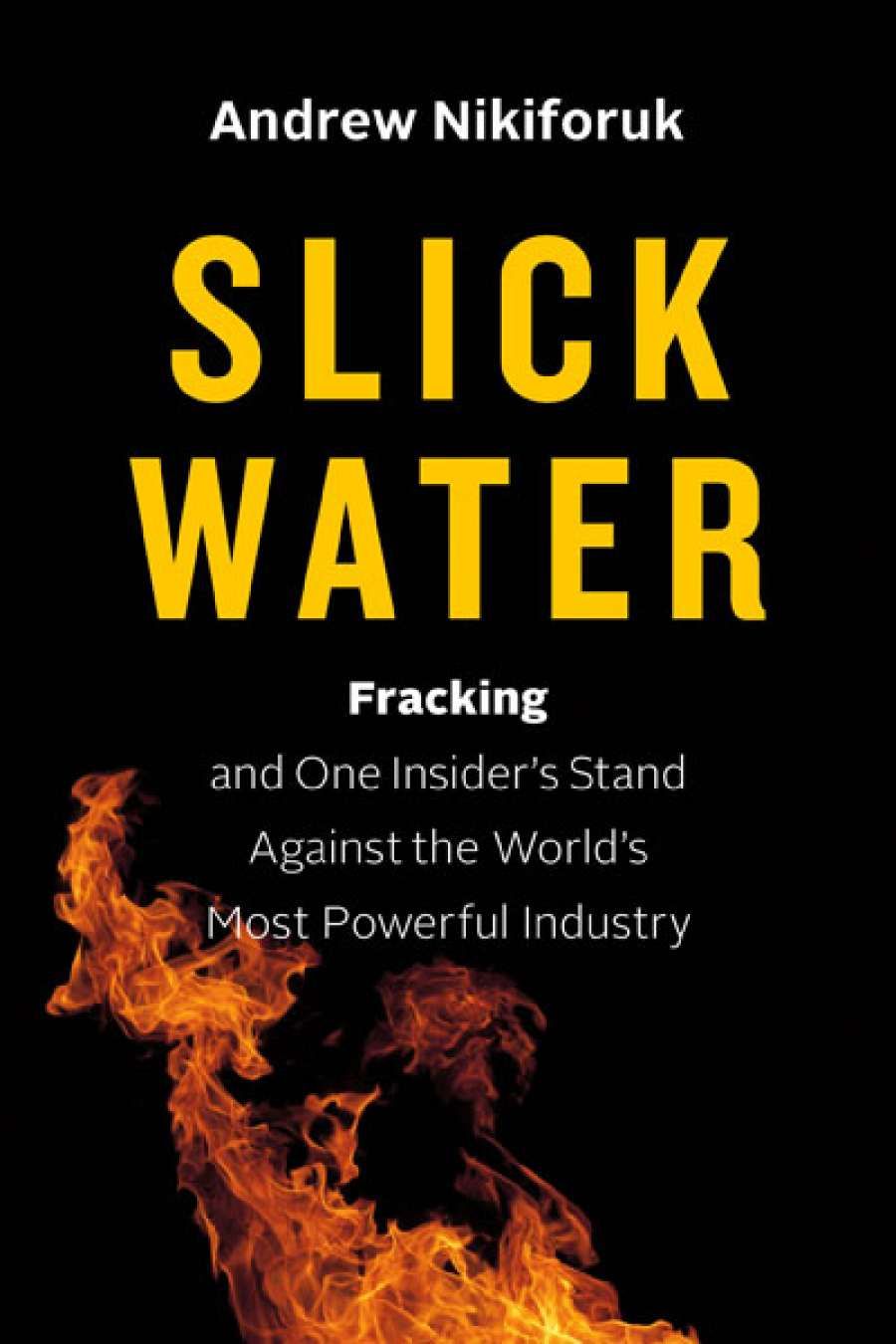
- Free Article: No
- Contents Category: Environmental Studies
- Custom Article Title: Ruth A. Morgan reviews 'Slick Water' by Andrew Nikiforuk
- Book 1 Title: Slick Water
- Book 1 Subtitle: Fracking and One Insider’s Stand Against the World’s Most Powerful Industry
- Book 1 Biblio: Greystone Books (NewSouth), $34.99 hb, 359 pp, 9781771640763
In simple terms, hydraulic fracturing or 'fracking' involves the injection of fluids to crack rock and release oil and/or natural gas. The process originated on the Pennsylvanian oil fields in the mid-nineteenth century, and was eventually perfected after World War II. The oil industry took to fracking with gusto and over the next two decades enthusiastically fracked half a million largely vertical and shallow wells with all kinds of fluids, including water, napalm, crude oil, kerosene, diesel oil, fuel oil, and even blackstrap molasses. Then came nuclear fracking, which 'promised to release endless fountains of fossil fuels'.
Despite the increasing scale and complexity of the fracking process, fracking was widely considered to be an 'art' with few means to limit the extent of its fractures. As the cheap and easy sources dried up, the industry advanced into increasingly impermeable formations that lay deep underground and required vast resources to extract oil and gas. In slick-water fracturing, the industry found a method that would enable commercial production from these reservoirs by using large amounts of highly pressurised water 'slicked' by friction reducers and other chemicals to fracture shale, tight sands, and coal formations.
Remarkably, the hazards of hydraulic fracturing, evident from the outset, have largely gone unheeded. In the United States, fracking has 'left a troubling legacy of exploding homes, flammable water, uncontrollable methane seeps, and earthquake swarms'. Furthermore, the fractures that fracking produces are unpredictable and difficult to contain, as they follow the path of least resistance. Geologically and politically, as Ernst warned an Irish community, '[F]racking brings a war that knows no borders.' Despite the risks that fracking poses to prime agricultural land and livelihoods, the cosy relationship between the fossil fuel industry and government has allowed fracking to go unquestioned for too long. As the Alberta Energy Regulator is entirely funded by industry, it is unsurprising that fracking projects were poorly regulated, with little law enforcement, and minimal groundwater monitoring.
 Jessica Ernst on her land (photograph by Colin Smith)
Jessica Ernst on her land (photograph by Colin Smith)
Ernst's legal saga has seen her depicted as a Canadian Erin Brockovich seeking environmental justice. In Slick Water, she is a Joan of Arc, a martyr, personally bearing the brunt of the full force of the fossil fuel industry. Her story echoes that of American marine biologist Rachel Carson, who withstood the ridicule of the chemical industry in the 1960s after the publication of Silent Spring (1962). Like Carson, Ernst is attuned to the widespread ecological and intergenerational impacts of fracking. Literary scholar Rob Nixon describes such forms of environmental degradation as 'slow violence'. For Nikiforuk and Ernst, violence is at the heart of fracking: a process of exploding the Earth's crust, supported by a vanguard of vested interests, to produce combustible fossil fuels.
In 2013, Ernst learnt she had an ally in Australia. Three years earlier, environmental specialist Simone Marsh had blown the whistle on the failure of the Queensland government to properly assess the impact of fracking projects on groundwater. Watching the ABC Four Corners report, 'Gas Leak!', Ernst watched the Condamine River in southern Queensland bubble with methane gas as a consequence of fracking. There are about 5,000 wells in eastern Australia. Despite a Senate recommendation for a moratorium on fracking in Queensland, the mining of coal seam gas continues in the Sunshine State.
For Nikiforuk and Ernst, fracking is not simply an issue for Alberta, Canada, or even North America, but is an issue of planetary proportions. They argue that we should be looking for alternative sources of energy, rather than prolonging the use of fossil fuels. As three decades of climate change talks suggest, the political will for such an endeavour remains hard won. But perseverance is vital. As Ernst reminds us, 'Many fleas make big dog move.'


Comments powered by CComment